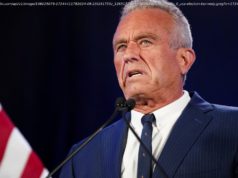His corruption is a national security issue.
A foreign government — an American ally, no less — can’t just murder a US resident with impunity while he’s on the soil of a NATO member state because they didn’t like his newspaper columns.
And yet that seems to be exactly what President Donald Trump wants to let Saudi officials do, explaining to reporters on Thursday that he does not want to respond to the murder of Washington Post columnist Jamal Khashoggi because “I don’t like stopping massive amounts of money coming into our country” and “I don’t like stopping an investment of $110 billion in the United States.”
Trump’s nonchalance is getting some pushback from Congress, which is welcome, including some actual action from Sen. Bob Corker (R-TN), who has often complained about Trump but rarely done anything.
Still, while a little inter-branch tension on this subject is welcome, it leaves unexamined the elephant in the room. Why is Trump so willing to let the Saudis slide? Is Trump getting paid by Saudi Crown Prince Mohammed bin Salman, a.k.a. MBS, and the Saudis? Is his son-in-law, Jared Kushner?
Normally, these would be absurd questions to raise about a president. But they are serious. Trump has commented before on his business ties to Saudi Arabia, bragging at a campaign rally in Alabama about how much business he did with Saudi interests. And he’s never fully aired the extent of his vast business and financial ties.
Now, as the White House is preparing to make policy (or not) in a crucial moment, how can the public have any confidence that the president isn’t just looking out for his own interests and not the country’s?
After Trump told reporters he didn’t want to lose the billions the Saudis spend on American goods, he suggested that perhaps because Khashoggi was murdered in Turkey, and because he is a permanent resident of the US but not a citizen, it’s all just no big deal.
US intelligence agencies are leaking like sieves trying to make the opposite point, getting word out to the American public that the American government has solid evidence that things are exactly as they appear, and that the Saudi government was behind the mysterious disappearance and likely murder of Khashoggi .
A Washington Post report based on US intelligence intercepts of Saudi officials states that MBS personally “ordered an operation to lure Washington Post columnist Jamal Khashoggi back to Saudi Arabia from his home in Virginia and then detain him.”
Meanwhile, the United States has no ambassador accredited in Riyadh. Instead, the relationship is in the hands of Kushner, an unqualified nobody whose personal finances are shot through with conflicts of interest.
It’s a situation no normal president would tolerate. But no normal president would have Trump’s level of financial conflicts of interest.
“Saudi Arabia — and I get along great with all of them. They buy apartments from me,” Trump said at a 2015 rally in Alabama. ”They spend $40 million, $50 million. Am I supposed to dislike them? I like them very much.”
There’s nothing illegal about making money from rich Saudis. And as Max Fisher explained in his 2016 Vox feature on Saudi influence in American politics, there’s nothing all that unusual about political elites aligning their foreign policy views with Gulf money. But what’s unique about Trump is the extent to which he is able to personally profit from the Saudi government while in office. This August, for example, the general manager of the Trump International Hotel in Manhattan was pleased to announce that after two straight years of decline, revenue grew 13 percent in the first quarter of 2018.
Why? Well, according to a letter he wrote that was obtained by the Post, “a last-minute visit to New York by the Crown Prince of Saudi Arabia” played a key role.
We happen to know about that because of hard work by the journalists who uncovered it. The letter also noted the curious fact that, during this lucrative engagement, neither the crown prince nor any other members of the royal family actually stayed in the hotel, since it didn’t have suites as big as they wanted. Nevertheless, “due to our close industry relationships… we were able to accommodate many of the accompanying travelers.”
Maybe it was close industry relationships, or maybe it was a cash bribe paid by the leader of a foreign dictatorship to the president of the United States. Either way, it’s not something we found out about through President Trump’s financial disclosures because he doesn’t make any meaningful financial disclosures. And it’s not something we found out through a congressional investigation because congressional Republicans have stonewalled all efforts to figure out what’s going on with Trump’s money.
We happen to know this because a hotel general manager put this particular bit of news in writing and somehow it leaked to the Post.
It’s almost certainly not the only instance of a foreign state putting money directly into Trump’s pockets with disturbing implications for the conduct of US foreign policy. But the only way to find out how often it happens or what policy choices it’s linked to would be to get a Congress that bothers to care.






